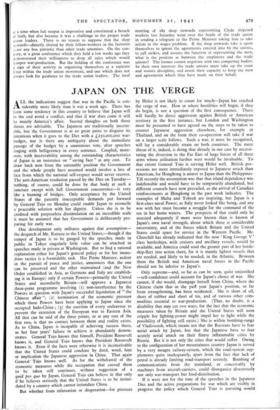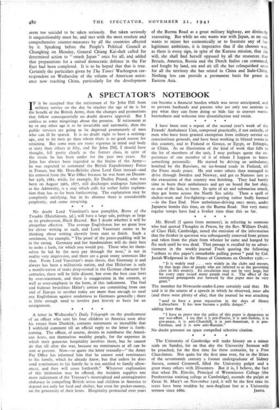JAPAN ON THE VERGE
ALL the indications suggest that war in the Pacific is con- siderably more likely than it was a week ago. There has been some tendency in this country to believe that Japan will in the end avoid a conflict, and that if war does come it will be mainly America's affair. Second thoughts on both those theses are advisable. The Japanese are traditionally inscrut- able, but the Government is at no great pains to disguise its intentions when it goes to the Diet with a £250,000,000 war- budget, nor is there any ambiguity about the immediate passage of the budget by a unanimous vote, after speeches ringing with belligerency in every sentence. Coupled, more- over, with inscrutability among the outstanding characteristics of Japan is an insistence on " saving face " at any cost. To draw back now from the untenable position the Government and the whole people have assumed would involve a loss of face from which the national self-respect would never recover. The anti-American resolution passed by the Diet on Tuesday— nothing, of course, could be done by that body at such a juncture except with full Government concurrence—is very like a burning of bridges. Only acceptance by the United States of the patently inacceptable demands put forward by General Tojo on Monday could enable Japan to reconcile a peaceable solution with her dignity. Unless she is to be credited with purposeless dissimulation on an incredible scale it must be assumed that her Government is deliberately pre- paring for early war.
One development only militates against that assumption— the despatch of Mr. Kurusu to the United States,—though if the temper of Japan is to be gauged by the speeches made in public in Tokyo singularly little value can be attached to speeches made in private at Washington. But to find a rational explanation either for Japan's general policy or for her imme- diate tactics is a formidable task. Her Prime Minister, ardent in the pursuit of peace and justice, announces that the one can be preserved and the other maintained (and the New Order established in Asia, as Germans and Italy are establish- ing it in Europe) only if certain Powers—primarily the United States and secondarily Britain—will approve a Japanese three-point programme involving (i) non-interference by the Powers in question with Japan's successful liquidation of " the Chinese affair "; (2) termination of the economic pressure which those Powers have been applying to Japan since she occupied Indo-China ; (3) the exertion of every endeavour to prevent the extension of the European war to Eastern Asia. All that can be said of the three points, or at any rate of the first two, is that no contact between them and reality exists. As to China, Japan is incapable of achieving success there, as her four years' failure to achieve it abundantly demon- strates. General Tojo knows that himself, President Roosevelt knows it, and General Tojo knows that President Roosevelt knows it. Even if the facts were otherwise it is inconceivable that the United States could condone by deed, word, hint or implication the Japanese aggression in China. That again General Tojo knows well. As for the withdrawal of the economic measures while the occupation that caused them to be taken still continues, without suggestion of a quid pro quo by Japan, General Tojo can believe in that only if he believes seriously that the United States is to be intimi- dated by a country which cannot intimidate China. But whether from infatuation or desperation—for pressure by Hitler is not likely to count for much—Japan has reached the verge of war. How or where hostilities will begin, if they do begin, is not a question of the first consequence. There will hardly be direct aggression against British or American territory in the first instance, but London and Washington must be presumed to have agreed on the steps to be taken to counter Japanese aggression elsewhere, for example in Thailand, and on the form their co-operation will take if war on a larger scale follows. Such a war, it must be recognised, will lay a considerable strain on both countries. The mere threat of it, indeed, is doing that already in our case by necessi- tating the diversion to the Far East of large forces of all three arms whose utilisation further west would be invaluable. To that extent General Tojo is serving Hitler well. British pos- sessions are more immediately exposed to Japanese attack than American, for Hongkong is nearer to Japan than the Philippines. Till recently the assumption was that that island dependency was indefensible and would have to be temporarily abandoned, but different counsels have now prevailed, as the arrival of Canadian reinforcements at Hongkong in the past week indicates. The examples of Malta and Tobruk are inspiring, but Japan is a first-class naval Power, as Italy never looked like being, and any war with her must become a struggle for the command of the sea in her home waters. The prospects of that could only be assessed adequately if more were known than is known of Japan's own naval strength, about which there is considerable uncertainty, and of the forces which Britain and the United States could spare for service in the Western Pacific. Mr. Churchill has already indicated that the new ' King George V ' class battleships, with cruisers and ancillary vessels, would be available, and America could send the greater part of her battle- ship-fleet into action there, for it is mainly lighter vessels that are needed, and likely to be needed, in the Atlantic. Between them the British and American naval forces in the Pacific should not be inferior to Japan's.
Only supreme—and, so far as can be seen, quite unjustified —self-confidence could account for Japan's choice of war. She cannot, if she would, disengage herself from China, where the Chinese claim that in the past year Japan's position, so far from strengthening, has been weakened. She is short of oil, short of rubber and short of tin, and of various other com- modities essential to war-production. (That, no doubt, is a disability that may cut two ways, for the fact that the economic measures taken by Britain and the United States will soon cripple her fighting-power might impel her to fight while the possibility of fighting still exists.) She is within bombing-range of Vladivostok, which means not that the Russians have to fear aerial attack by Japan, but that the Japanese have to fear acutely aerial attack on their flimsy inflammable cities by Russia. But it is not only the cities that would suffer. Owing to the configuration of her mountainous country Japan is served by a very meagre railway-system, which the road-system sup- plements quite inadequately, apart from the fact that lack of petrol is already limiting road-transport severely. Bombing of communications from the mainland, or conceivably by machines from aircraft-carriers, could disorganise disastrously not only war-transport but food-distribution.
If it were not for the tone of the speeches in the Japanese Diet and the active preparations for war which are visibly in progress the ,policy which General Tojo is pursuing would seem too suicidal to be taken seriously. But taken seriously it unquestionably must be, and met with the most resolute and comprehensive counter-measures by all the countries affected by it. Speaking before the People's Political Council at Chungking on Monday, General Chiang Kai-shek called for determined action to " smash Japan " once for all, and added that preparations for a united democratic defence in the Far East had been completed. It is to be hoped that that is true. Certainly the particulars given by The Times' Washington cor- respondent on Wednesday of the volume of American assist- ance now reaching China, particularly for the development of the Burma Road as a great military highway, are distinctly reassuring. But while no one wants war with Japan, as no one wants to injure her economically or to frustrate any of her legitimate ambitions, it is imperative that if she chooses war, as there is every sign, in spite of the Kurusu mission, that she will, she shall find herself opposed by all the resources that Britain, America, Russia and the Dutch Indies can command, and fought by land, sea and air till she has relinquished once for all the territory she has seized in China and Indo-China. Nothing less can provide a permanent basis for peace in Eastern Asia.



























 Previous page
Previous page